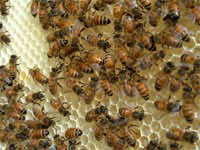WASHINGTON/Nairobi,
8 August 2008 – A new project worth $26.45
million has been launched by the Global
Environment Facility to better protect bees,
bats and birds that are essential to the
world’s crop production.
The unique five-year
project “Conservation & Management of
Pollinators for Sustainable Agriculture
through an Ecosystem Approach”, which will
be implemented through the United Nations
Environment Programme (UNEP), will help
ensure food security through the protection
of the key pollinator species.
The project is coordinated
by the Food and Agriculture Organization
on United Nations and will be executed through
partnerships with the Governments of Brazil,
Ghana, India, Kenya, Nepal, Pakistan and
South Africa in collaboration with stakeholders
from different environment and agricultural
communities at national and international
level, including ministries, research institutions,
agencies, academia, NGOs, private sector
and farming communities.

The GEF will contribute
$7.8million and leverage another $18.65
million from other partners which include
multilateral organizations, governments
and academic institutions.
In recent months, the
decline and even collapse of important pollinator
populations like honey bees have been detailed
in scientific journals and in news reports.
Pollinators such as
birds, bees, butterflies, bats and even
mosquitoes are essential for food production
because they transfer pollen between seed
plants-impacting 35 per cent of the world’s
crops. As a result, farmers and consumers
alike strongly rely on these “pollinators”
for their very survival.
Along with providing
an essential service to human populations,
pollinators also have a key role in maintaining
other ecosystem services including ensuring
biodiversity and helping nature to adjust
to external threats such as climate change.
For these reasons, pollinators are known
as a “keystone species” in many terrestrial
habitats.
The main threats to
pollinators can be linked to disease, pesticide
use, habitat loss and degradation, monocultures
and the introduction of exotic species,
causing concern not only among agricultural
producers but conservationists as well.
The UNEP/GEF project
‘Conservation & Management of Pollinators
for Sustainable Agriculture through an Ecosystem
Approach’ will contribute to the conservation,
sustainable use and management of pollinators
by:
developing and implementing
tools, methodologies, strategies and best
management practices for pollinator conservation
and sustainable use;
building local, national,
regional and global capacities to enable
the design, planning and implementation
of interventions to mitigate pollinator
population declines, and establish sustainable
pollinator management practices; and
promoting the coordination
and integration of activities related to
the conservation and sustainable use of
pollinators at the international level to
enhance global synergies.
Notes to editors:
The GEF unites 178 countries
in partnership with international institutions,
non-governmental organizations (NGOs), and
the private sector to address global environmental
issues while supporting national sustainable
development initiatives. Today the GEF is
the largest funder of projects to improve
the global environment. An independent financial
organization, the GEF provides grants for
projects related to biodiversity, climate
change, international waters, land degradation,
the ozone layer, and persistent organic
pollutants. Since 1991, GEF has achieved
a strong track record with developing countries
and countries with economies in transition,
providing $7.6 billion in grants and leveraging
$30.6 billion in co-financing for over 2,000
projects in over 165 countries.
For more information, please contact Christian
Hofer
Anne-France White, Associate Information
Officer,

